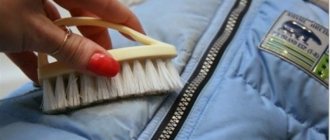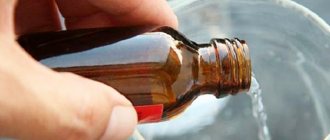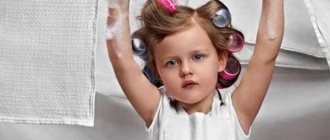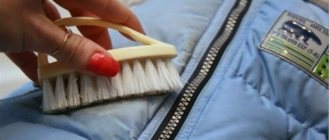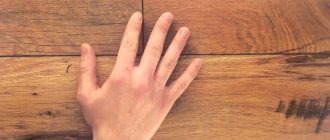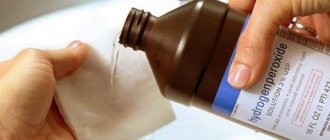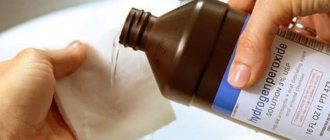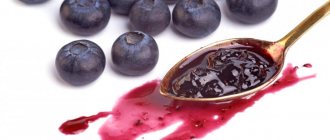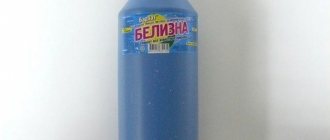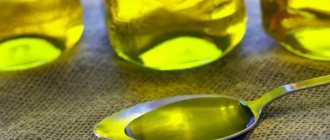Kitchen towels are an indispensable attribute of any kitchen.
Due to the specific nature of their use, they get very dirty and are difficult to clean during normal washing. How to wash kitchen towels from old greasy stains at home?
To remove complex old greasy stains, you will need time-tested home recipes and household chemicals.
Wash by hand or machine
Proper and regular washing of kitchen textiles is 50% of the success of their long service life. To do this, prepare the products correctly, follow the appropriate washing algorithm, and choose the appropriate products.
Preparing towels
Before washing, prepare towels for washing. First of all, remove heavy stains using a special stain remover or improvised means. It would also be a good idea to soak them in a soda or saline solution for 4–5 hours or pour boiling water over them.
What means should I use?
For regular washing of not too soiled towels, regular laundry detergent is suitable. If you decide to soak your towels first, use a saline solution or non-chlorine stain removers for colored materials, and baking soda or chlorine-containing bleach for white ones.
Secrets of automatic washing
Before putting the towels into the drum, sort them by color: separately light ones, separately – with bright colors and prints. Try to process kitchen textiles separately from other things. Select the temperature of the mode, taking into account the characteristics and colors of the material. White cotton towels can be washed in water 90–95 degrees, colored ones - no higher than 60 degrees, and synthetic ones - in cold water up to 40 degrees.
For heavily soiled towels, soak them or set them to an additional pre-wash cycle. Also try to remove stubborn stains before treatment. You can pour not only laundry detergent into the powder compartment, but also bleach or stain remover in proportions according to the instructions.
Be sure to set an additional rinse program to better rinse the powder from the fibers and use a high spin speed.
Hand washing rules
If you wash kitchen textiles by hand, follow the following procedure:
- Fill the basin with hot water.
- Add laundry detergent and a little vinegar to soften the water.
- Leave the textiles in the soap solution for half an hour.
- Thoroughly scrub stubborn dirt and stains onto the material.
- Remove and rinse under the tap.
- Fill the basin again with hot water and add 15 g of salt.
- Rinse the towels.
- Unscrew the towels and hang them to dry.
Features of drying towels
It is worth noting that proper washing of kitchen textiles alone is not enough. Improper drying can lead to bad consequences and damage to the appearance. To avoid this:
- do not dry towels in the bathroom, as they may remain damp;
- the best place for drying is the street or balcony, and in winter - a heated towel rail;
- hang items in one layer;
- Try to let the towel dry within 24 hours, otherwise an unpleasant odor will appear.
If you do not have the opportunity to immediately wash kitchen textiles after use, be sure to dry them thoroughly and only then put them in the dirty laundry basket.
Recommendations
Up-to-date advice on choosing and caring for kitchen towels will help you keep this demanding element of your kitchen design in order.
These include the following:
- It is better not to use terry fabrics in the kitchen.
- Changing towels frequently will help keep them tidy. With active use, they need to be replaced once a day.
- Expensive towels with embroidery and other decor are not practical to use in the kitchen.
- Natural cotton or linen is the most convenient option for the kitchen.
- When washing, you can add starch to the water.
- It is advisable to wash kitchen textiles as they become dirty, avoiding the appearance of old stains.
- Ironed towels are less likely to get dirty.
- After washing, items must be immediately removed from the washing machine and hung to dry. Otherwise, the fabric may retain an unpleasant odor.
- Before washing, soiled towels should be stored in a net or basket that provides good ventilation.
Household chemicals
To eliminate unpleasant odors, stubborn dirt and remove stains, you can use store-bought bleaches and stain removers. The list of such funds includes:
- Bleach or Nanny Ear soap. Suitable for removing stains from various materials. Shows maximum effectiveness in hot water.
- Bleach "ACE". Effective both when soaking and when washing automatically.
- Whitening soap "Maxima". Shows effectiveness when soaked for a long time for 6–9 hours.
- Stain remover "Udalix". Works quickly on stains and works best when diluted in very hot water.
- Stain remover "SmellOFF". Added directly to the drum before washing. Eliminates dirt and odor.
More effective products on the market deserve special attention and a more detailed study of their properties.
Stain remover Dr. Beckmann "fats and sauces"
Stain remover from the German brand “Dr. Beckmann" is designed to remove food stains. It contains substances that act at the molecular level on products of organic origin.
The product does an excellent job of cleaning various materials and can be used for multi-colored items. Available in a small bottle in gel form. The active components have a lightning-fast effect on stains. It is enough to apply the required amount of the substance to the material and leave for 10 minutes. After the procedure, be sure to wash your towels.
Amway spray SA8
Sold in packages with a spray dispenser, making it very economical to use. The components of the stain remover quickly act on various types of contaminants, and at the same time do not harm the fibers at all.
It is enough to simply spray the substance onto the stain at a distance of approximately 15 cm. After application, washing is required immediately.
Oxygen Stain Remover
Oxygen stain remover is designed to remove stains of various types on all types of materials. Among the advantages, the effectiveness of the product and the ability to remove even old contaminants stand out.
Use stain remover immediately before washing, as the substance should not be allowed to dry on the fabric. Apply the mixture to the stain and after a few minutes wash it in a machine or by hand.
With soaking: 7 recipes of your choice
What should you soak kitchen towels in before washing to remove stains to make it easier to remove stubborn dirt?
- Method 1. You will need 5-6 liters of hot water, soda, washing powder, dry bleach (Boss, Fancy, Swan, etc.), sunflower oil (all powders take 3 tablespoons). Stir thoroughly. Soak the towels overnight, wring them out and machine wash them.
- Method 2. According to another version, the same solution is prepared, but based on boiling water. Then place dry towels into the mixture and leave until cool. Then all that remains is to rinse. Your kitchen helpers will look like new! This recipe allows you to remove not only grease stains at home: coffee, tea, and dirt fly off the fabric like little ones.
- Method 3. Pour boiling water into the basin. Pour in a mixture consisting of “Boss” and “Persol” oxygen bleaches (1-3 tablespoons each, depending on the volume of water). Soak the towels. Leave until completely cool and wash with powder.
- Hydrogen peroxide 3%. Add peroxide (30 ml) to warm water (5 l), soak the laundry for 6-8 hours.
- Dishwashing gel. Apply gel generously to stains. Leave it for a day. Do the laundry.
- Salt. Soak the laundry in a strong solution of salt and water (1:1 ratio).
- Ammonia 10%. You will need water (2 parts) and ammonia (1 part). Apply the solution directly to the stain and leave for 2-3 hours.
"Lazy" (Japanese?) Soaking Method
For some reason this recipe was called “Japanese”, although it is very difficult for me to imagine a Japanese lady doing this. Still, sakura... Geisha there... Samurai...
Traditional methods for removing stains and odors
Don’t immediately run to the store for an effective stain remover. You can always find effective substances at home, in the kitchen cabinet, on the bathroom shelf or in the medicine cabinet.
Lemon acid
For the procedure, you will need a bag of regular citric acid. You can use the substance in several ways:
- The easiest way to use citric acid. Simply dissolve 1 teaspoon of lemon in 2 liters of warm water and soak the items before washing.
- Rub greasy and shiny stains with laundry soap and sprinkle thoroughly with citric acid powder. Leave the substances for a couple of hours. Then rinse the towels thoroughly.
- Prepare a saturated soap solution and add a little citric acid at the rate of 1 teaspoon per liter of liquid. Soak the towels in the resulting mixture for half an hour, and then wash them as usual.
- For this cleaning option, you will also need lemon juice and a plastic bag. Dissolve a packet of citric acid and freshly squeezed lemon juice in 250 ml of warm water. Thoroughly soak the towels with the composition and pack them in plastic for a couple of hours.
- At the last stage, remove them from the bag and rinse.
Hydrogen peroxide
After washing, do not send the towels to dry, but place them in water with a dissolved bottle of peroxide. Keep the textiles in the solution for half an hour, rinse and only then put them in the dryer.
Table vinegar
To soften organic stains, use vinegar. The acid will not only remove dirt, but also remove musty odors, restore the brightness of colors and soften the fibers of the material. Soak the items in water and vinegar for 24 hours and then wash. For a better cleaning effect on white towels, you can add a little baking soda to the solution.
Boric acid
You can use the medicine in both powder and solution.
You can use the method using boric acid powder to clean not only kitchen towels, but also any dense fabric. Dissolve a tablespoon of powder in several liters of hot water and leave the products in the resulting solution for 2 hours. After the procedure, wash the textiles using any method.
When using a boric acid solution, also use laundry soap shavings. Grate a bar of soap and dissolve it in 6–7 liters of water. After the soap has dissolved, add 90 ml of boric acid solution to the liquid. Leave in the liquid for 3-4 hours and then wash as usual.
Mustard
Mustard powder copes well with stains on both white and colored materials.
To carry out comprehensive cleaning of products, pour 50 g of dry mustard into 5 liters of water. Stir the mixture and leave to brew for 4 hours. Pour the solution into a basin without touching the sediment, and soak the textiles in it overnight. Afterwards, wash the items in the machine.
To remove local contamination, prepare a thick mixture of warm water and mustard powder. Apply the mixture to the stains and leave for 2 hours. After exposure, carefully shake off any remaining substance, rinse and wash the towel in a machine or by hand.
Ammonia
Mix ammonia with hot water in equal dosage and place towels in the resulting mixture for half an hour. Then wash it.
You can enhance the effect of the substance with laundry soap. Prepare a soap solution from soap and water and place it on the stove to warm up. Without bringing to a boil, pour 50 ml of ammonia into the liquid and add 2 tbsp. spoons of soda ash. Place the towels in the mixture, bring to a boil and simmer for 30 minutes over low heat.
Soda ash or baking soda
Soda ash cleanses stains most effectively. Add the substance when washing according to the instructions on the package, and in a dosage corresponding to the weight of the laundry and the degree of soiling.
Also use regular baking soda depending on how deeply the stains are embedded in the material. You can remove fresh traces of organic matter by adding 4 tbsp to the washing powder. spoons of soda when washing. You can remove moderate stains by dissolving 30 g of soda and the same amount of powder in hot water and leaving to soak overnight. To remove stubborn stains, first dissolve 200 g of laundry soap in hot water, and then add a pack of soda. Mix the mixture and add 9 liters of water. Soak overnight and then boil the items in the solution for 20-30 minutes.
Silicate glue
To remove stains from white towels, use silicate glue with soda. Add the substances to the water and boil. Dip towels into the solution and boil for half an hour. Afterwards, rinse the towels thoroughly under running water and send them to dry. You can use both baking soda and soda ash for the procedure. If desired, you can replace soda with laundry soap shavings.
Shampoo
For the procedure you will need shampoo for oily hair. If the stains are fresh, it is enough to replace the washing powder with shampoo, adding it to the detergent tray before washing. You can remove more stubborn stains by soaking towels in hot water with shampoo for 3-4 hours or applying undiluted shampoo to the stains for a couple of hours.
Soap
A universal remedy for fighting stains is laundry soap. The substance actively acts on contaminants of various origins and does not harm the fibers of the material at all. To wash kitchen textiles, soap heavily soiled areas with soap and leave to soak for 24 hours. Then wash the items as usual.
Salt
Table salt will help remove greasy stains from the material. Prepare a saline solution in the proportions of 30 g of salt per 1 liter of water and soak the towels in the mixture overnight. The next morning, put your towels in the wash.
Vegetable oil
For the procedure you will need 125 g of washing powder and the same amount of any vegetable oil. Mix the ingredients and add boiling water. Compact the product into a container with liquid and press down with a press. Keep things in the composition for 24 hours. After the allotted time, remove the towels from the container and wash.
Dishwashing liquid
You can increase the effectiveness of washing powder in combating greasy stains by using dishwashing detergent. Simply add some liquid to the detergent drawer. You can also soak the towels in water with dissolved cleaning powder for several hours. After soaking, rinse thoroughly and put in the wash.
Potassium permangantsovka
Use the potassium permanganate solution immediately after washing. Before removing items from the drum, prepare a solution of potassium permanganate. Dissolve a small amount of granules in a glass of water to obtain a purple liquid. Add a little concentrated solution to 5-6 liters of boiling water until it turns pink. Pour the liquid into a basin and add 250 g of washing powder. Be careful, when the powder combines with potassium permanganate, active foam is formed, so it is better to add it by placing a container with a solution of potassium permanganate in the bathroom. Fold the towels into the liquid and leave until the water cools. Then rinse the towels and dry.
You can also mix an undiluted manganese solution with a soap solution. Dissolve a bar of laundry soap in 2 liters of warm water, and then add 20 drops of concentrate. Pour boiling water over the mixture and soak towels in the resulting solution until cool. Then rinse the products and dry in natural conditions.
Purchased funds
The assortment of modern stores is rich in various household chemicals. On the shelves of the supermarket you will find soap, liquids, washing gels and powders, stain removers, bleaches, etc.
Washing powders
The best powders that have proven themselves in the fight against difficult stains:
- Sarma Active;
- BiMax 100 spots automatic;
- Persil Expert Frosty Arctic.
They are universal, suitable for any fabric, they can be used for soaking, hand washing, and machine washing.
Stain removers
Stain removers are used for colored items, including towels. As a rule, they are based on active oxygen. The best stain removers, according to housewives:
- “Sarma Active 5 in 1” (copes with complex stains even in cool water, ideal for all types of kitchen towels);
- “Ace Oxi Magic” (available for white and colored items, works even at low temperatures, designed for any type of washing);
- “Heitmann OxiWash Intensiv” (removes stains from colored and white textiles, used for machine wash only).
Bleaches
For white towels, bleaches are more suitable, as they usually not only remove stains, but also lighten the fabric.
Important: Aggressive chlorine-containing products are excellent at removing stubborn stains, but they thin out the fibers and cause towels to wear out faster.
The most popular chlorine bleaches are “Ace” and “Whiteness”.
Oxygen-containing bleaches are identical to stain removers. They cope best with complex stains:
- Chirton Oxygen;
- Vanish;
- Bos+;
- Persol.
It is recommended to use bleaches and stain removers for soaking and then add to the powder/gel during washing.
If the stains are old or complex
The towel should be soaked for several hours (at least 2 hours, if the product is cotton or linen, then for 8-10 hours) in warm water with powder and stain remover or bleach. To 10 liters of water add 150 g of powder and 70-80 g of bleach. After soaking, the product must be rubbed well, then washed in an automatic machine.
How to wash towels in the microwave
Resourceful housewives have invented a method with which you can wash kitchen textiles in just 5 minutes. For this, in addition to available means, a microwave oven is used. Procedure:
- Wet the towels and wring them out.
- Rub the entire surface of the material with laundry soap.
- For stubborn stains, apply a little dishwashing liquid.
- Pack the towel in a plastic bag, but do not close it tightly.
- Place the bag of towels in a ceramic plate and place in the microwave.
- Set the cooking mode to medium and run the program for 2 minutes.
Afterwards, wash the towels in a machine or by hand.
Using a microwave
This method is very effective, but you should take into account the fact that the smell of powder or bleach may remain in the microwave oven for a long time, and you may even have to wash and ventilate it. Otherwise, you may end up with heated food that smells like household chemicals. The best option is to use an old microwave.
You can wash kitchen towels in the microwave in just a couple of minutes without much effort.
When carrying out this procedure, you cannot be distracted; everything must be under control and timed. It is prohibited to increase the power and duration, since the plastic bag is a flammable item.
How to bleach correctly:
- For one bookmark, take no more than three towels. They should be wetted and anti-stain applied or well soaped with laundry soap. When removing greasy stains, you can use dishwashing detergent. The foam on towels, especially in stained areas, should be plentiful.
- Then the towels are placed in a tight plastic bag that is not tied.
- Set the power to 400-500 W and turn on the microwave for 90 seconds.
- After receiving the readiness signal, you should carefully check the temperature of the towels so as not to get burned. They must be hot, otherwise the procedure must be repeated.
- To avoid burns, hot towels are removed from the oven with kitchen tongs and placed in the drum of a washing machine for rinsing, or rinsed by hand.
- Subject to safety precautions, this method will allow you to wash towels simply, quickly and easily. This unusual washing will help give the fabric its pristine whiteness and cope even with old stains, and most importantly, save time.
The best way to bleach fresh stains is to use a microwave.
This method can be used many times, it is effective not only for towels, but also for T-shirts and shirts.
Japanese way
The method is also popularly called “lazy”, since it does not require many actions. For the procedure you will need:
- 5 liters of water;
- 250 g mustard powder;
- 30 ml vinegar;
- 60 ml vegetable oil.
Operating procedure:
- Mix the ingredients thoroughly.
- Warm the water to 60 degrees.
- Dissolve the cleaning mixture in hot water and pour the solution into a bucket.
- Place towels in the solution and cover the bucket with plastic.
- To ensure the tightness of the container, glue the polyethylene with tape or secure with an elastic band.
- Leave to soak overnight.
The next morning, remove the towels from the solution and rinse thoroughly 5-6 times.
DIY washing powder
This ECO powder is absolutely safe for health and it washes perfectly!
- Grate a piece of laundry soap on a fine grater. Grating soap is even easier than chopping carrots.
- Add baking soda and soda ash (the volume of each powder is the same as grated soap).
- Mix it up.
- If desired, add 10-20 drops of essential oil (lavender, orange, peppermint, etc. What do you like?).
- Stir again.
- Pour into a jar, close the lid. Store in a dry, dark place.
- When washing, you need to pour 2 tablespoons of our eco-powder into the powder compartment.
This powder perfectly removes dirt, and it does not contain phosphates or other additives harmful to health. Things washed with this powder become soft, smell pleasant, and do not lose color. The skin does not itch, as often happens after a store-bought product. The same powder can be used to treat surfaces. For example, washing the floor.
How to properly boil kitchen towels
Please note that it is recommended to boil towels in containers that are no longer used for cooking.
| Boiling method | For whitening | From the smell | From stains | From stubborn dirt |
| Ingredients |
|
|
|
|
| Action plan | Mix the ingredients and pour 2 liters of boiled water. Dip towels into the mixture and leave for several hours. After treatment, wash the textiles by hand or in a machine. | Combine the ingredients and pour 7 liters of very hot water. Pour the mixture into a saucepan and place on the stove. Place the towels in the solution and boil. Simmer over low heat for an hour. | Pour the ingredients into 5 liters of hot water and heat on the stove. Place the towels in a container, boil and simmer for 20-30 minutes. | Dissolve the ingredients in hot water and put the mixture on fire. Boil towels in the solution for 40 minutes. |
Boiling with home remedies
Timely cleaning measures help return textile products to their ideal condition and impeccable appearance. It is easier to wash kitchen towels free of grease if the dirt has not had time to penetrate deep into the fibers.
Boiling is only allowed for white towels. Bright colors may be damaged during this process. To achieve perfect whiteness, you need to adhere to the following rules:
- First of all, dirty things need to be washed. This will help remove all old stains from the surface. If you neglect this point, then when boiling, the contaminants will penetrate even deeper into the fabric;
- Bleaching kitchen towels should not be a frequent procedure. This will lead to depletion of the material and disruption of the integrity of the fibers.
For maximum effect, the boiling process should last no more than 1 hour. After this, the kitchen towels are rinsed and washed again.
Vegetable oil
Some housewives do not even suspect that you can also bleach kitchen towels using vegetable oil. What you will need for this:
- water;
- enamel bucket or basin;
- 2 tbsp sunflower oil;
- 2 tbsp bleach;
- half a bar of laundry soap.
In an enamel container, bring 10 liters of water to a boil. Then add vegetable oil, bleach (preferably powder) and finely grated laundry soap.
As soon as all the components are dissolved in water, towels are placed there. They are brought to a boil and boiled for 10-15 minutes. The procedure can be increased in time, depending on the degree of contamination of the towels. After turning off the gas, the towels are left in the soap-oil solution until completely cool. Afterwards the product is washed in any way using powder.
We collect water Bleach + vegetable oil + laundry soap Boil
Baking soda
Washing kitchen towels using vegetable oil can be problematic. Therefore, there is another effective cheap remedy that should be present in the arsenal of every housewife - baking soda. It is added to hot water while boiling. What is needed for this:
- Bring several liters of water to a boil in an enamel bucket;
- Gently add 1 cup of baking soda and stir;
- Place the towels in the soda solution and boil for an hour.
When boiling is finished, the towels can be washed by hand or in a washing machine with powder, as usual.
Place textiles in boiling water Pour in a glass of soda
Boil for 1 hour
Laundry soap (boiling)
Laundry soap is actively used in everyday life for any needs. It is also great for boiling kitchen towels. You can return them to their original whiteness as follows:
- Fill an enamel bucket with water exactly halfway and boil;
- Grate a bar of laundry soap (at least 72%) on a fine grater and mix with 3 tablespoons of baking soda;
- Add the mixture to boiling water and stir until the soap is completely dissolved;
- Reduce heat to low, place towels in the solution and boil for half an hour;
- After boiling, wash the towels with powder and bleach in the washing machine.
Boil towels
Add soda and soap until completely dissolved. Boil
How to get rid of stains
For the method to work, it is worth considering not only the degree of contamination of the products, but also the nature of the stains.
Fresh traces of food
To remove fresh stains from material, simply wash the items in a machine and then leave them to soak in water with bleach or stain remover. For white towels, you can also use boiling bleach.
From fat
To remove greasy stains of plant and animal origin you can use:
- vinegar;
- soda;
- ammonia;
- laundry soap;
- peroxide.
Potato starch also absorbs greasy marks well. Just first pour the substance onto the problem areas and leave it for a while to take effect.
Coffee stains
These types of stains are considered the most difficult to remove. The best remedy for removing traces of coffee and tea is considered to be ammonia. You can use the substance in its pure form, mixing it with water in equal proportions, or first add 60 ml of ammonia and 15 ml of glycerin to a liter of water.
In both cases, soak the textiles in the solution for half an hour and then wash.
We remove old stains
Old stains are usually considered to be those that remain on the material for more than a week. To remove such stains, use citric acid or hydrogen peroxide. Dissolve the substances in warm water and soak the products for at least half an hour. After this, wash the textiles as usual: by hand or in the washing machine.
Whitening kitchen towels
Most often, housewives use white towels. Unfortunately, fat and other substances are quickly absorbed into the material, and the item becomes unusable. That is why you need to figure out how to bleach kitchen towels at home. In fact, there are a huge number of ways to bleach fabric. Each housewife must decide for herself how to whiten things.
Vegetable oil
The described method will make your towels snow-white
Few people know, but it is possible to wash kitchen towels with vegetable oil even if they are heavily soiled. Of course, this method may seem strange, but this does not mean that it is not effective.
To start bleaching things with sunflower oil, you need to prepare an appropriate solution. To prepare it you will need:
- Refined vegetable oil in the amount of 2 tablespoons;
- Any washing powder in the amount of 100 grams;
- Dry bleach in the amount of 2 spoons;
- Water at least 5 liters. The water must first be boiled.
It should be noted that the water should be at least 80 degrees, then the whitening effect will be better. All components are thoroughly mixed, and then a towel is added
It is important that the towel is in the solution for at least 3 hours. After the specified time has passed, you can wash the item in a washing machine on a standard cycle.
Potassium permanganate can also whiten towels well.
Potassium permangantsovka
Towels in the kitchen should always be clean. That is why they need to be not easily washed, but also bleached.
It is recommended to pay attention to traditional methods, since you can bleach towels at home using improvised means.
A solution of laundry soap, water and potassium permanganate copes well with the task. Before removing stains, the solution must be properly diluted. For 9 liters of water take 90 grams. soap and a pinch of potassium permanganate. The darker the liquid, the stronger the solution. This information should be taken into account when washing heavily soiled items.
First, the towels must be soaked in the resulting solution for 6 hours. After the specified time has passed, the items are thoroughly rinsed.
It is important to remember that these methods cannot be used to remove stains from colored items.
Ammonia and hydrogen peroxide
Traditional methods involve the use of scrap materials, which is why you need to know how to bleach terry towels in various ways. Effective remedies include a solution of ammonia and hydrogen peroxide
It is important that all proportions are respected. For 6 liters of water you need to take 2 spoons of peroxide and 1 spoon of ammonia
Soak towels in water with dish soap added
Simply dip the towel in the solution for 20 minutes and then rinse. Then the item will need to be dried. If the method does not help, you need to try again.
Mustard
Another effective way of whitening is washing with mustard. First you need to prepare a solution. To do this, mix 1 liter of boiled water with 15 grams of mustard powder.
When the product is ready, the towel is immersed in the solution for 3 hours. After this, the item must be rinsed several times.
Dishwashing liquid
Since it can sometimes be difficult to remove grease from kitchen towels, it is recommended to use dishwashing detergent. It is enough to dilute the product in hot water and then soak the towels in it. After 30 minutes the towel will be clean and bleached.
Features of cleaning white, black and multi-colored towels
| Light | Black | Multicolored |
| Can be washed in hot water up to 95 degrees and boiled. It is allowed to use bleaches with chlorine and active oxygen. | Products can only be washed in non-hot water at temperatures up to 40 degrees. It is prohibited to use any stain removers or bleaches, and it is also not recommended to use boiling. | For washing, use water at a temperature of 40 to 60 degrees, depending on the degree of contamination. It is absolutely unacceptable to boil towels, since along with the stains, the paint will be removed from the fabric. To remove stubborn stains, only oxygen stain removers are allowed. |
Features of removing fresh and old stains
It is not difficult to remove fresh grease stains; sometimes one wash using ordinary powder is enough. You can add bleach if desired.
Old grease stains must be further treated before washing: wipe the stain with a cotton pad with acetone, gasoline, etc., cover the stain with a paste-like mixture of available cleaning products or soak in a special solution.
In especially severe cases, it will not be possible to remove the greasy stain even this way. Then immediately after washing it is boiled over low heat using ordinary powder, bleach or other suitable means. At the same time, you cannot use dishes in which food is prepared - chemicals can settle on the walls of the container and subsequently saturate the food. It is also necessary to take into account that boiling with bleach is not suitable for colored products, since strong agents corrode the paint.
Important! Dirty towels can only be boiled in enamel containers.
How to keep towels fresh for a long time?
To keep kitchen textiles clean for a long time:
- wash and dry kitchen textiles correctly, and most importantly, on time;
- do not use towels as rags for wiping kitchen surfaces;
- Have a separate hand towel;
- Use oven mitts for hot dishes;
- wash towels separately from other items;
- try to change a set of kitchen towels every 2-3 days;
- choose waffle rather than terry products for the kitchen, as the latter wash less well and after several washes lose their attractive appearance;
- Ironing will help keep kitchen textiles fresh.
If you are planning a holiday dinner, give preference to paper napkins, so you will spend much less effort and time.
Useful tips for caring housewives
- To keep your towels clean longer, you need to change them as often as possible, this will also extend their service life.
- White towels must be soaked and boiled so that they always delight the eye with their freshness.
- Use your towels only for their intended purpose. Do not wipe dirty floors with them or use them as potholders.
- Don’t be lazy, and be sure to iron your kitchen textiles with a hot iron.
- For kitchen work, try to use waffle towels. They not only absorb moisture well, but also dry quickly. Good quality waffle towels can be used for many years without losing their attractive appearance.
- When there is a lot of turmoil in the kitchen, buy and use napkins or disposable towels, this will keep your towels clean.
How to starch?
If you want your kitchen towels to look presentable, try starching them.
For the procedure you will need 1 liter of water and a little potato starch. The concentration of the substance is determined based on the thickness of the products. For kitchen towels, 50–60 g of starch per 1 liter of water is usually enough.
To begin, thoroughly dilute the substance in 100–150 ml of water. Pour the remaining liquid into a saucepan and bring to a boil. Pour the starch solution into the water in a thin stream and cook until the mixture becomes clear. Dip the items into the liquid and let them soak in the solution. After this, wring out the towels and send them to dry.
If you don’t have time for the procedure, you can use a ready-made product in the form of a spray or liquid starch
Finally...
Surely, many have realized that it is easier to prevent a problem than to eliminate it, spending energy, nerves, and sometimes considerable money on it. The same can be said about almost any aspect of our lives, so draw your own conclusions!
And it should also be noted that any housewife strives for comfort and cleanliness, especially in the kitchen, because here she spends quite a significant part of her time. There are plenty of options for keeping kitchen towels clean, and many are really effective. We have brought you the most effective of them, try it - and cleanliness will be a companion to your kitchen space. Good luck!
What can replace towels?
If you don't want to bother with washing and boiling kitchen textiles, use alternative options. For example, use special microfiber cloths to wipe kitchen surfaces, and paper towels and napkins for hands or other purposes.
You can achieve cleanliness and freshness of kitchen towels using a huge number of methods, both using store-bought products and using improvised substances. Choose the most suitable products, taking into account the degree of contamination of the material and the nature of the stains.
Washing colored kitchen towels
Every housewife should know how to wash kitchen towels so that they are not only clean, but also do not lose their attractiveness.
If you use the wrong product, you can discolor the fabric, thereby making the towel unattractive.
It’s not difficult to stain something, but getting rid of the stain is not always easy. Before washing, you need to consider the material from which the towel is made. Of course, most of the methods are applicable to many materials, but it is better to carefully study each method.
Terry
Colored terry towels are best washed at 50 degrees. If washing is carried out in a washing machine, then you should select the standard mode.
Please note that before washing, items must be soaked in a vinegar solution. Add 20 ml to 0.9 liters of warm water. vinegar. If the towel is not very dirty, you can use a stain-removing soap solution.
Before washing, towels should be soaked in vinegar solution.
When washing, it is recommended to add a little salt to the water, this way the towel can be made soft. After washing, the towel must be rinsed at least 3 times. To add aroma, you can use special products. To choose the right substance, you need to read reviews. When rinsing is completed, the washed towel is sent to dry.
Waffle
Most housewives prefer to use waffle towels. They, like terry towels, get dirty quickly and need to be washed constantly. It should be noted that colored towels should be washed separately from other items. In addition, do not forget that it is strictly forbidden to use bleach, otherwise the fabric will quickly discolor and become flabby.
You can use dishwashing detergent, since it will be impossible to wash towels soaked in grease with plain soda. It is best to soak the fabric before washing.
Dry mustard
Dry mustard is a proven and effective stain remover, indispensable in the fight against greasy stains. This natural and organic method is the safest. It is important to use mustard for those who are allergic to the powder. It is not difficult to prepare the composition; for this you should:
- Prepare 2 tbsp. spoons of dry mustard and hot water.
- Pour the spice into the liquid and let it brew.
- Strain the suspension and add the required amount of water (3-5 l).
- Towels are placed in a basin with mustard water overnight.
- Textiles should be washed as usual.
This method will allow you to efficiently disinfect your laundry and return it to its original color.
Advice! Instead of fabric softener, try a cheaper method that is just as good. Mix baking soda with any aromatic oil - the mixture will give softness and a pleasant aroma to your linen.
How to wash kitchen mitts
Oven mitts are a convenient and necessary attribute in the cooking process, which can cause your hands to burn. Using this item, you can easily remove or rearrange hot dishes, hold a lid or baking sheet, drain water from a hot pan, and so on.
This product makes cooking in the kitchen comfortable and safe. But the product is constantly in contact with food and fat, which invariably leaves marks on the material. But it is quite difficult to remove such stains. In this article we will learn how to wash oven mitts.
Boiling: will it help or not?
The traditional way to clean kitchen towels is by boiling. This method was often used in the past.
But you should not take it into service as the main one for several reasons:
- colored kitchen towels should not be boiled, as they may fade or lose color;
- Suitable for white cotton fabrics only;
- intense exposure to high temperatures can lead to rapid wear of the material;
- Pre-washing is necessary to remove the main contaminants, otherwise under the influence of high temperatures they will, on the contrary, become fixed.
Digestion is a rather lengthy process. To achieve the result, towels must be boiled using soda or another product for at least an hour, then rinsed and washed again.
The video will show you how to remove grease stains from fabrics and towels by boiling:
The power of laundry soap
Every housewife has a bar of 72% laundry soap at hand, which is used for hand washing - socks, tights, work clothes, rugs and rugs. The composition of the soap effectively removes old and deeply penetrated dirt. You can wash kitchen towels with no less success. How to wash towels with laundry soap:
- The recipe is applicable for all types of greasy stains on colored and snow-white fabrics.
- Dirty kitchen napkins and towels are thoroughly rubbed with soap.
- Place the textiles in a plastic bag and leave overnight without boiling.
- You can wash dirty towels by hand and rinse well.
Regular laundry soap will help deal with greasy stains on kitchen textiles
When folding contaminated items, you need to roll the bag so that no air gets inside. An effective recipe without boiling for greasy stains of various origins - oil, grease, hand marks, dirt from vegetable and animal fat. At the same time, the unpleasant specific odor disappears.
When are vinegar and silicate glue used?
Those who don’t know how to remove mold stains should pay attention to this method. Soak the towel in vinegar for 10 minutes. The textiles are then sent to the machine for washing.
Silicate glue will help deal with stains on white towels. Preparing the composition is not difficult. A bar of soap with the addition of 1 tbsp. spoons of glue should be heated in a saucepan. Textiles are placed in the prepared mixture and boiled for 30 minutes. Washing kitchen towels in the machine is the final step of the procedure.
Additional Methods
In addition to the popular well-known methods of washing kitchen towels, they also use those that involve various means
It is important to use them correctly to turn dirty table linens into clean ones.
Dishwashing liquid and shampoo
It is difficult to protect laundry in the kitchen from oil drops and stains after cooking. The greasy layer spoils the appearance of the napkins. They are difficult to wash. But if you use ordinary dishwashing liquid, the stains will quickly come off. Before washing, simply wipe off the stains with the product, then leave for half an hour.
Shampoo is used to remove stains from berries and fruits.
Laundry soap
The contaminated area on a white towel can be washed using laundry soap. They wipe the area with it before soaking or washing. You can grate the bar, dissolve it in water and boil heavily dirty linen and cotton items.
Soda ash and bleach
The laundry will become clean if you boil it in water with soda ash. The substance is also used for soaking products.
Bleach is used to bleach washed towels. First prepare a solution of 100 grams of lime per liter of soft water. The resulting liquid is added to 20 liters of water. In addition to bleaching, the liquid is used for disinfection.
Purchased chemicals
The chemical industry offers strong bleaches. They are used according to the instructions. They will make your laundry clean, but their constant use leads to thinning of the fibers.
Chlorine-containing
The concentrated solution of “Belizna” contains chlorine, which quickly decomposes in the light. To bleach a cotton towel, you need to take 12 grams of liquid per 5 liters of water. Leave the fabric for up to 30 minutes. The water should be cool, 20 degrees.
Oxygen
Oxygen-containing bleaches are effective at water temperatures of 60 degrees. This way, active oxygen is better released, which breaks down greasy and other stains.
Optical
Particles of this type of bleach are classified as luminescent dyes. When deposited on fabric, ultraviolet rays are released.
Popular brands
Among bleaches, every housewife knows those that have proven themselves to be the most effective. They are gentle on fabrics, washing clothes clean.
"Ace"
The product is based on sodium hypochloride with a concentration of 5%. Suitable powder for white and colored fabrics. The drug is effective even in cold water.
"Amway"
Liquid or powder fights all types of stains on fabrics. Can be used with all washing powders. The main substance peroxide carefully penetrates deep into the fibers, removing old dirt and yellowness. After treatment with the product, there are no stains left on kitchen towels.
"Vanish"
This product brings washed items into excellent condition. After treating the stains, the colors of the fabrics do not change and remain bright. Active oxygen oxidizes stains without destroying the structure of cotton and flax fibers.
Soap and silicate glue
Use the product like this:
- Pour 50 ml of silicate glue into 10 liters of water and add half a bar of grated laundry soap.
- Place on fire and bring to a boil.
- Then put dirty table linen into the pan and boil for 20-30 minutes
- Place the removed items in the washing machine.
At the end of washing, rinse the rags thoroughly.
Shampoo
You can remove any stains from the fabric with a solution into which shampoo is poured. The water temperature should be between 40-60 degrees. Textiles should be left for an hour. Then they are washed. Fat stains, as well as those from berries, are washed off well from wine.
How to bleach effectively in the microwave
An interesting way to wash dirty kitchen towels is to:
- wet the laundry and rub the stains with laundry soap;
- placed in a polyethylene bag;
- placed in the oven open;
- set a timer for 1-2 minutes.
After rinsing, the towels look clean.
Precautionary measures
When removing stubborn greasy stains, you should take certain precautions. There is no need to use radical cleaning methods more than once a month, otherwise you can ruin your kitchen linen. Experts recommend boiling and bleaching only white or light waffle towels. The structure of other fabrics, as well as bright colors, will lose their original properties under the influence of aggressive drugs and boiling water. The towel will become unsuitable for further use.
To get rid of old stains on colored or terry towels, it is preferable to use more gentle folk remedies or oxygen-containing bleaches. They act gently, do not damage the structure of the fabric, and do not affect the color.
Don't forget about your own safety. When using traditional methods, for example, when washing kitchen towels with mustard, there is no adverse effect on the skin of the hands. But when choosing more radical methods, it is recommended to use gloves. They will protect the skin from the negative effects of detergents.
Recipes
People have long discovered the high effectiveness of vegetable oil in washing heavily soiled laundry. Therefore, today a lot of recipes have accumulated, which are still used by housewives to this day.
Sunflower oil and bleach
This recipe is suitable for washing yellowed towels and bed linen.
You will need the following ingredients:
- 100 g of any washing powder;
- 80 g dry bleach (for example, “Ace”);
- 100 ml refined sunflower oil;
- 100 ml table vinegar (9%).
All this is diluted in boiling water and immersed in dirty towels. The next day, wash in the washing machine as usual.
If the laundry is white, then you can use any bleaching agent. To soak colored fabrics, replace it with Persol.
The video will show you how to bleach white towels using vegetable oil and bleach:
We use laundry soap
An indispensable cleaning product in everyday life is laundry soap. And in the fight against stubborn dirt on kitchen towels, it is used no less actively.
For this recipe you will need:
- water – 10 liters;
- enamel container;
- 90 ml sunflower oil;
- 100 g liquid or dry bleach;
- ½ brick of laundry soap.
Operating principle:
- The water is brought to a boil.
- Add the remaining ingredients. Only soap is first grated with shavings.
- Mix thoroughly until all particles are completely dissolved.
- Place laundry in the solution and boil for about 15 minutes (longer if very dirty).
- Turn off the stove and do not remove the towels until the soap-oil solution has completely cooled.
Then wash the clothes as usual. To guarantee perfectly clean towels, it is recommended to soak them overnight in a soap-herbal mixture.
With potassium permanganate
When you need to return the original whiteness to kitchen linens or napkins, you can use the following product:
- Dilute potassium permanganate in water until a slightly pinkish solution is obtained.
- Mix in a little shavings of laundry soap and 1 tbsp. l. vegetable oil.
- Immerse soiled laundry in the solution and leave for at least 10 hours.
- After that, they take it out and put it in the washing machine.
Add vinegar
This option is somewhat similar to the previous one, but it is more suitable for bleaching a large volume of dirty laundry. Also, there is no need to boil it.
Required components:
- hot water – 15 liters;
- 9% vinegar – 3 tbsp. l.;
- washing powder – 220 g;
- powdered bleach – 120 g;
- odorless sunflower oil – 130 ml.
The listed components are added to water and mixed. Textiles are soaked in the resulting solution overnight and washed in the morning.
This method is suitable not only for fabric kitchen towels, but also for terry ones.
With soda
If, after removing the towels from the machine after washing, remaining stains are found, proceed as follows:
- Soak them in an oil solution with the addition of soda and washing powder. Each component is taken in an amount of 3-4 tbsp. spoons and pour into hot water.
- The laundry is kept in this solution for up to 10 hours.
- After this, it is washed again in the machine.
Mustard powder
This recipe comes from Japan and has been used for washing clothes since ancient times. True, it had to be changed a little in a modern way, but the essence remained unchanged.
What you need to prepare:
- mustard powder – 1 tbsp. l.;
- table vinegar – 40 ml;
- pure vegetable oil – 40-50 ml;
- water (heated to 60 ᵒC).
The first 3 components are diluted in water and mixed thoroughly. Then soak the towels for 10-12 hours. After the set period has expired, the laundry is rinsed first in warm, then cool water.
We use ammonia
Another option that copes well with stubborn stains on kitchen textiles.
Instructions for use:
- Add 50 ml of ammonia to a five-liter bucket filled with hot water.
- Then add 40 ml of 9% table vinegar and 80 ml of dishwashing detergent.
- Stir and place dirty napkins and towels in there.
After three hours of exposure, the laundry should be slightly wrinkled by hand, removed and rinsed in clean water.
Simple rules to follow in the kitchen
- When purchasing, special attention should be paid to the material. Terry towels are soft and dense. However, it is better to refuse this choice, since the fabric takes a long time to dry, and bacteria accumulate between the pile. It is better to give preference to waffle or linen products.
- Changing and washing towels should be regular. The best option would be to change every 3 days. This will help avoid stubborn dirt and significantly extend its service life.
After prolonged use, textiles can be removed from stains, but over time they acquire a grayish tint.
- After washing and drying, it is recommended to iron the kitchen accessory, like other textiles. Ironed materials are less susceptible to contamination and have a more aesthetic appearance.
- It is not recommended to use the towel as a pot holder or for wiping the floor of a stove or sink after washing. Hot surfaces can cause holes to appear. After treating the floor or sink, greasy stains and stains will remain, which are very difficult to remove.
In this form, towels do not fit into the interior of an expensive kitchen, and women are increasingly looking for an answer to the question: “How to bleach kitchen towels at home.”
